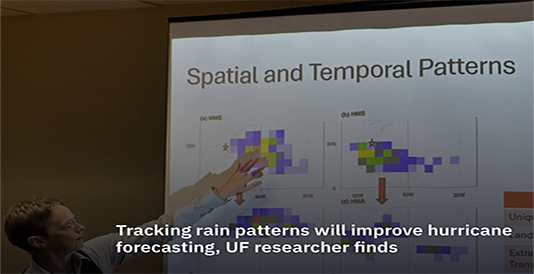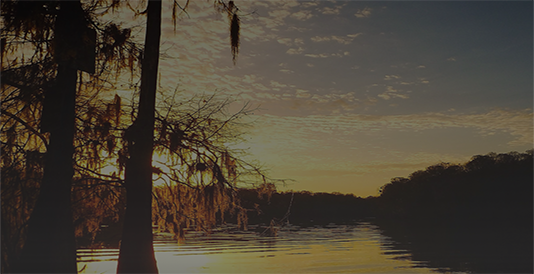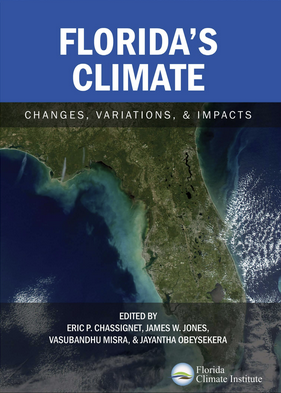Contact Person: Evelyn Gaiser
Collaborators: FIU biologists Evelyn Gaiser, John Kominoski and Tiffany Troxler; and others
Institutions: Arizona State University, Florida International University, and others
Funding Agency: NSF
Status: Funded
Filed Under: Human Dimensions; Climate Sciences
Contact Person: Griffin, Melissa
Collaborators: D. Zierden, M. Jagger
Institutions: Florida State University
Funding Agency: State of Florida Department of Health/Center for Disease Control and Prevention
Status: Funded
Filed Under: Human Dimensions
Abstract: David Zierden and Melissa Griffin with the Florida Climate Center are collaborating with the Florida Department of Health on a project involving climate variability, climate change, and public health in Florida. The project is called Building Resilience Against Climate Effects (BRACE) and is receiving multi-year funding from the Centers for Disease Control and Prevention. The project kicked off with a meeting of the technical advisory committee (chaired by David Zierden) on May 29, 2013, in Tallahassee. The Florida Climate Center is assisting in the preparation of a climate and health profile report and examining how various aspects of climate change can impact public health and disease risks.
Contact Person: Smith, Shawn
Collaborators: M. Schwadron
Institutions: Florida State University, Southeast Archeological Center (National Park Service)
Funding Agency: NPS
Start: 2013 -
Status: Funded
Filed Under: Climate Sciences, Education, Coastal Ecosystems, Human Dimensions
Abstract: The Southeast Archeological Center (SEAC) of the National Park Service (NPS) has partnered with the Center for Ocean-Atmospheric Prediction Studies (COAPS) at the Florida State University to conduct an assessment of the risks posed by ongoing climate change to cultural resources at national parks in the Southeast. Preliminary studies have identified modern, colonial, and pre-colonial atmospheric and oceanographic data that can be used to assess the risks to irreplaceable cultural resource sites within Canaveral National Seashore and Everglades National Park. At these sites, rising sea level combined with the exposure of the Florida Peninsula to hurricanes are the most prominent risks to cultural resources.
Website: http://coaps.fsu.edu/npsContact Person: Bartels, Wendy-Lin
Collaborators: C. Fraisse, D. Zierden
Institutions: University of Florida, Florida State University, Southeast Climate Consortium, AgroClimate
Funding Agency: NCEP, USDA-NIFA, NOAA
Start: 2010 -
Status: Funded
Filed Under: Agriculture, Extension
Abstract: The broad aim of this Tri-state climate group is to encourage on-going interactions among row crop stakeholders for knowledge exchange and learning. Participants explore management options for adapting production systems in the face of a changing and variable climate. Workshops build and strengthen relationships and communication among participants involved in research, outreach, and practice. We emphasize hands-on, peer-to-peer learning through on-farm field visits, experimentation, and in-depth discussions. We strive to facilitate a two-way flow of information and ideas within this climate learning network so that local experiences can influence research directions (and vice versa).
Website: http://www.agroclimate.org/seclimate/row-crop-climate-group/PI: Dr. Tom Smith, Research Ecologist, Southeast Ecological Science Center, USGS
Filed Under: Terrestrial Ecosystems, Climate Sciences
Abstract: This project is being done for the South Atlantic LCC. The LCC covers the area from Tallahassee to Jacksonville in Florida and then northward including most of Georgia, the Carolinas and southern Virginia. Dynamically down-scaled climate model data from the USGS project "A Land of Flowers on a Latitude of Deserts," La Florida for short will be compared to statistically down-scaled datasets from several sources. Cooperating Investigators include Drs. Vasu Misra and Lydia Stephanova from COAPS, and Dr. Ryan Boyles, State Climatologist for North Carolina.
Opportunities
Funding
- Resilience: Vulnerability and resilience management for socio-environmental systems in exposed territories | October 17, 2025 (Pre-Proposals)
- NSF Atmosphere Cluster (AGS-AC) | ongoing
- NSF Geospace Cluster (AGS-GC) | ongoing
- Duke Energy Foundation | Ongoing

















